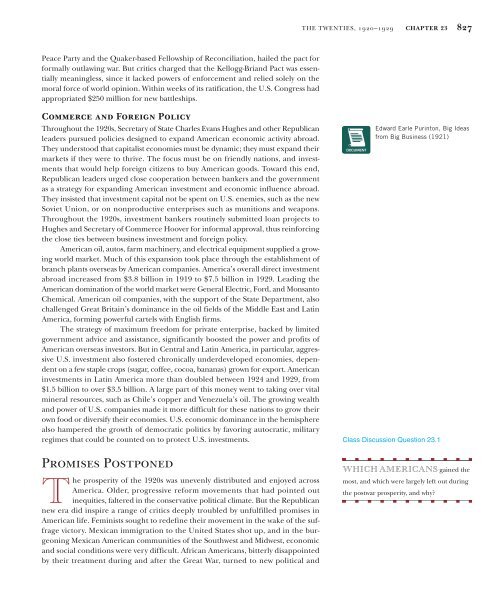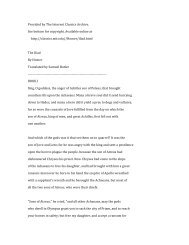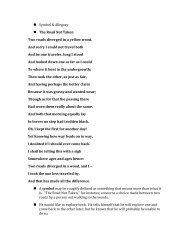The Twenties - Southwest Career and Technical Academy
The Twenties - Southwest Career and Technical Academy
The Twenties - Southwest Career and Technical Academy
You also want an ePaper? Increase the reach of your titles
YUMPU automatically turns print PDFs into web optimized ePapers that Google loves.
71193_23_ch23_p0800-0843 4/12/10 4:21 PM Page 827THE TWENTIES, 1920–1929 CHAPTER 23 827Peace Party <strong>and</strong> the Quaker-based Fellowship of Reconciliation, hailed the pact forformally outlawing war. But critics charged that the Kellogg-Bri<strong>and</strong> Pact was essentiallymeaningless, since it lacked powers of enforcement <strong>and</strong> relied solely on themoral force of world opinion. Within weeks of its ratification, the U.S. Congress hadappropriated $250 million for new battleships.Commerce <strong>and</strong> Foreign PolicyThroughout the 1920s, Secretary of State Charles Evans Hughes <strong>and</strong> other Republicanleaders pursued policies designed to exp<strong>and</strong> American economic activity abroad.<strong>The</strong>y understood that capitalist economies must be dynamic; they must exp<strong>and</strong> theirmarkets if they were to thrive. <strong>The</strong> focus must be on friendly nations, <strong>and</strong> investmentsthat would help foreign citizens to buy American goods. Toward this end,Republican leaders urged close cooperation between bankers <strong>and</strong> the governmentas a strategy for exp<strong>and</strong>ing American investment <strong>and</strong> economic influence abroad.<strong>The</strong>y insisted that investment capital not be spent on U.S. enemies, such as the newSoviet Union, or on nonproductive enterprises such as munitions <strong>and</strong> weapons.Throughout the 1920s, investment bankers routinely submitted loan projects toHughes <strong>and</strong> Secretary of Commerce Hoover for informal approval, thus reinforcingthe close ties between business investment <strong>and</strong> foreign policy.American oil, autos, farm machinery, <strong>and</strong> electrical equipment supplied a growingworld market. Much of this expansion took place through the establishment ofbranch plants overseas by American companies. America’s overall direct investmentabroad increased from $3.8 billion in 1919 to $7.5 billion in 1929. Leading theAmerican domination of the world market were General Electric, Ford, <strong>and</strong> MonsantoChemical. American oil companies, with the support of the State Department, alsochallenged Great Britain’s dominance in the oil fields of the Middle East <strong>and</strong> LatinAmerica, forming powerful cartels with English firms.<strong>The</strong> strategy of maximum freedom for private enterprise, backed by limitedgovernment advice <strong>and</strong> assistance, significantly boosted the power <strong>and</strong> profits ofAmerican overseas investors. But in Central <strong>and</strong> Latin America, in particular, aggressiveU.S. investment also fostered chronically underdeveloped economies, dependenton a few staple crops (sugar, coffee, cocoa, bananas) grown for export. Americaninvestments in Latin America more than doubled between 1924 <strong>and</strong> 1929, from$1.5 billion to over $3.5 billion. A large part of this money went to taking over vitalmineral resources, such as Chile’s copper <strong>and</strong> Venezuela’s oil. <strong>The</strong> growing wealth<strong>and</strong> power of U.S. companies made it more difficult for these nations to grow theirown food or diversify their economies. U.S. economic dominance in the hemispherealso hampered the growth of democratic politics by favoring autocratic, militaryregimes that could be counted on to protect U.S. investments.Promises Postponed<strong>The</strong> prosperity of the 1920s was unevenly distributed <strong>and</strong> enjoyed acrossAmerica. Older, progressive reform movements that had pointed outinequities, faltered in the conservative political climate. But the Republicannew era did inspire a range of critics deeply troubled by unfulfilled promises inAmerican life. Feminists sought to redefine their movement in the wake of the suffragevictory. Mexican immigration to the United States shot up, <strong>and</strong> in the burgeoningMexican American communities of the <strong>Southwest</strong> <strong>and</strong> Midwest, economic<strong>and</strong> social conditions were very difficult. African Americans, bitterly disappointedby their treatment during <strong>and</strong> after the Great War, turned to new political <strong>and</strong>Edward Earle Purinton, Big Ideasfrom Big Business (1921)Class Discussion Question 23.1WHICH AMERICANS gained themost, <strong>and</strong> which were largely left out duringthe postwar prosperity, <strong>and</strong> why?





